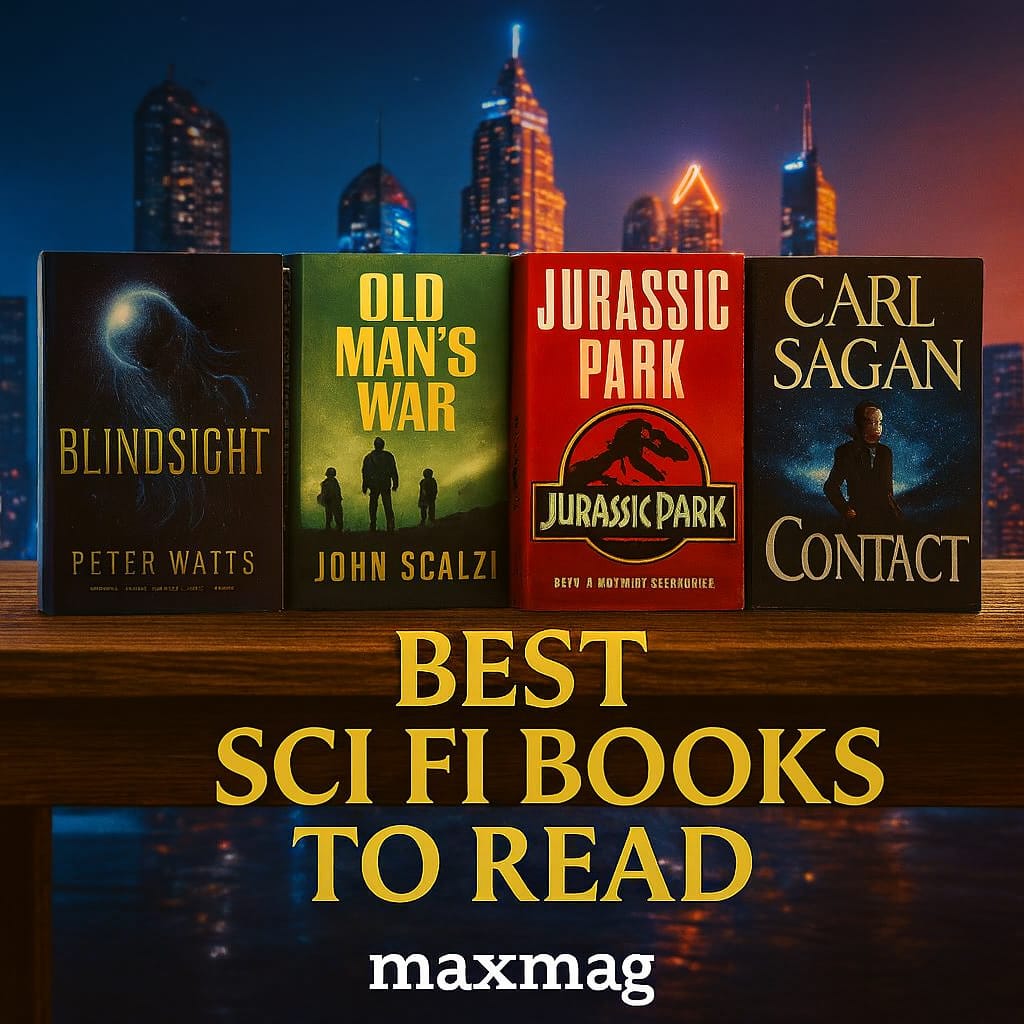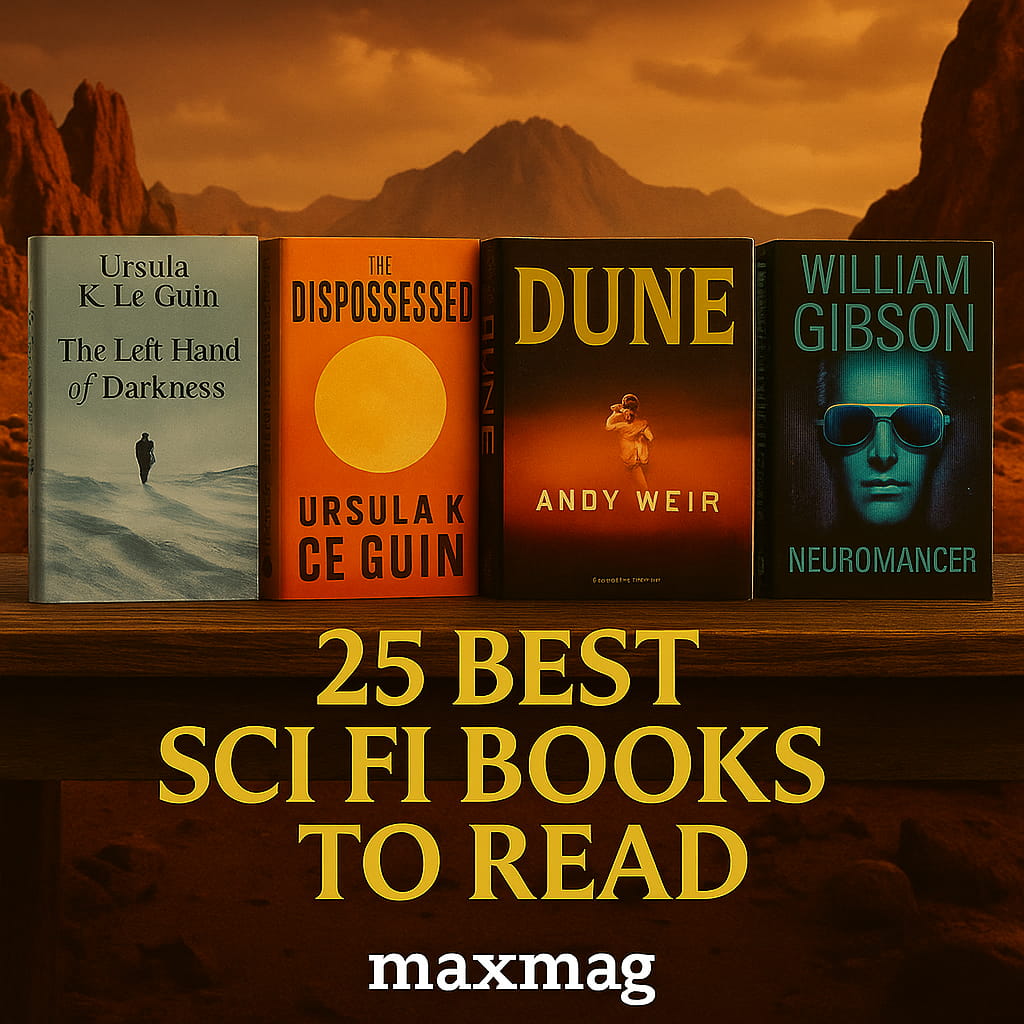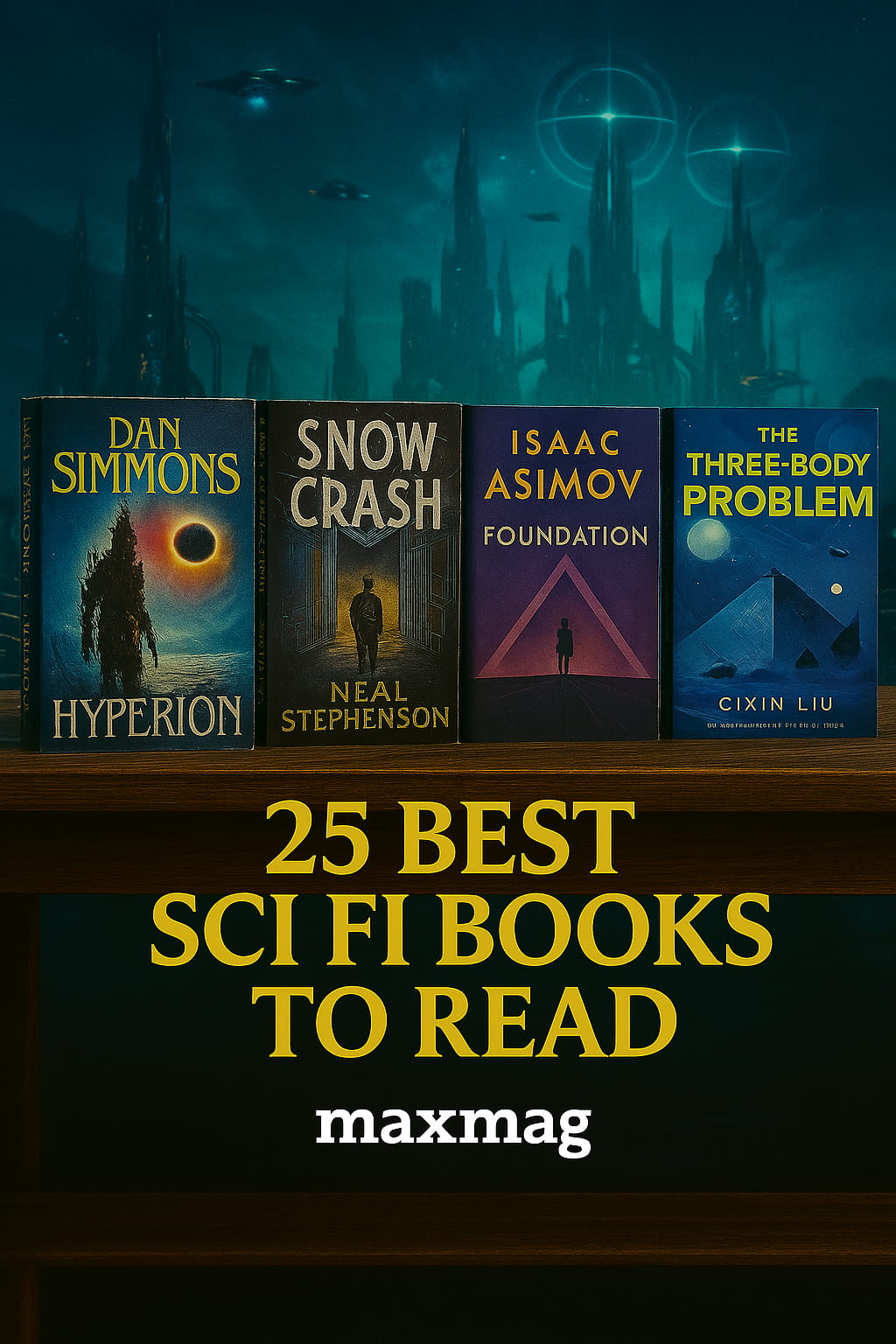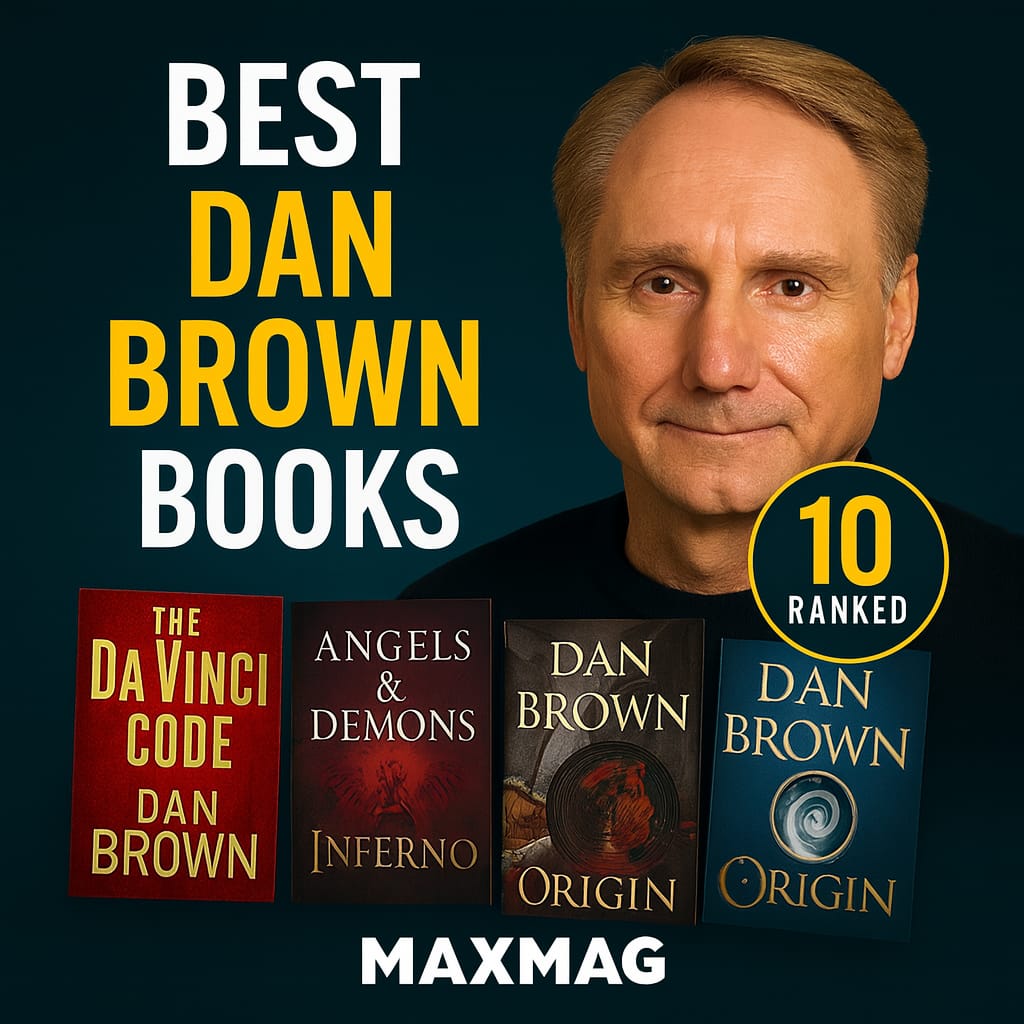
Best Sci Fi Books to Read opens the door to wonder without gatekeeping, inviting curious minds to ask big questions with page‑turning momentum. From the deserts of far‑future empires to quiet laboratories and messy living rooms, science fiction keeps its lens on people first. These selections span eras and subgenres, balancing idea‑driven thought experiments with character‑centered storytelling. You’ll find top sci‑fi books, cerebral mysteries, and soaring space epics sitting comfortably on the same shelf. We favored books that combine accessibility with depth, so a bold premise never drowns out heart and humor. Where possible, we opted for editions in wide circulation to make libraries and classrooms a simple next stop. Each pick rewards close reading and sparks discussion about ethics, technology, and what tomorrow might ask of us. If you’re choosing a book club starter or a solo escape, this list aims to be a reliable map rather than a rigid canon.
To keep quality high, every title here holds a Goodreads rating of 4.0/5 or better at the time of writing. The mix highlights household names alongside rediscoveries now enjoying renewed attention in best‑selling sci‑fi literature. We also note when a novel’s influence echoes through film, television, or gaming, offering extra routes for engagement. Across the spectrum you’ll encounter award‑winning sci‑fi novels, cult favorites, and campus staples that age remarkably well. We state the number of books up front so you can plan a reading arc or divide picks across a semester. Expect a balance of awe, fear, and curiosity, often braided together in scenes that linger long after the last page. Throughout, we point to recurring themes so readers can follow the threads they love—first‑contact wonder, political intrigue, or cosmic horror. And when a fresh adaptation or anniversary edition is relevant, we flag it as a nudge to explore further.
25 Best Sci Fi Books to Read — Start Here, Then Go Deeper
1) Dune – 1965
- Author: Frank Herbert
- Published: 1965
- Genre Tags: epic sci‑fi, politics, ecology
- Themes: power, religion, destiny
- Goodreads Rating: 4.23/5
Dune blends imaginative speculation with grounded human stakes in a voice that remains instantly readable. The premise unfolds with momentum and clarity, making it a standout in Best Sci Fi Books to Read conversations among lifelong fans and newcomers. Worldbuilding details serve character choices rather than encyclopedic lore, keeping tension tight and purposeful. Set pieces escalate in scale while returning to intimate questions about who we are when confronted with the unknown. Stylistically, the prose balances idea‑driven inquiry with cinematic beats that reward patient attention. This novel often surfaces in year‑end lists and reissue programs and remains a steady favorite in library holds queues. Its influence reaches across subgenres, shaping expectations for pacing, scope, and scientific plausibility. Readers leave with a resonant takeaway about curiosity, consequence, and the fragile bonds that hold communities together.
2) Ender’s Game – 1985
- Author: Orson Scott Card
- Published: 1985
- Genre Tags: military sci‑fi, coming‑of‑age, strategy
- Themes: leadership, empathy, survival
- Goodreads Rating: 4.30/5
Ender’s Game blends imaginative speculation with grounded human stakes in a voice that remains instantly readable. The premise unfolds with momentum and clarity, inviting even cautious readers to lean into the sense of discovery. Worldbuilding details serve character choices rather than encyclopedic lore, keeping tension tight and purposeful. Set pieces escalate in scale while returning to intimate questions about who we are when confronted with the unknown. Stylistically, the prose balances idea‑driven inquiry with cinematic beats that reward patient attention. This novel often surfaces in year‑end lists and reissue programs and remains a steady favorite in library holds queues. Its influence reaches across subgenres, shaping expectations for pacing, scope, and scientific plausibility. Readers leave with a resonant takeaway about curiosity, consequence, and the fragile bonds that hold communities together.
3) Hyperion – 1989
- Author: Dan Simmons
- Published: 1989
- Genre Tags: space opera, frame narrative, time
- Themes: pilgrimage, sacrifice, fate
- Goodreads Rating: 4.23/5
Hyperion blends imaginative speculation with grounded human stakes in a voice that remains instantly readable. The premise unfolds with momentum and clarity, inviting even cautious readers to lean into the sense of discovery. Worldbuilding details serve character choices rather than encyclopedic lore, keeping tension tight and purposeful. Set pieces escalate in scale while returning to intimate questions about who we are when confronted with the unknown. Stylistically, the prose balances idea‑driven inquiry with cinematic beats that reward patient attention. This novel often surfaces in streaming adaptations and long‑form podcasts and remains a touchstone in casual recommendations. Its influence reaches across subgenres, shaping expectations for pacing, scope, and scientific plausibility. Readers leave with a resonant takeaway about curiosity, consequence, and the fragile bonds that hold communities together.
4) The Left Hand of Darkness – 1969
- Author: Ursula K. Le Guin
- Published: 1969
- Genre Tags: planetary romance, sociology, classic
- Themes: gender, loyalty, culture clash
- Goodreads Rating: 4.12/5
The Left Hand of Darkness blends imaginative speculation with grounded human stakes in a voice that remains instantly readable. The premise unfolds with momentum and clarity, making it a standout in Best Sci Fi Books to Read conversations among lifelong fans and newcomers. Worldbuilding details serve character choices rather than encyclopedic lore, keeping tension tight and purposeful. Set pieces escalate in scale while returning to intimate questions about who we are when confronted with the unknown. Stylistically, the prose balances idea‑driven inquiry with cinematic beats that reward patient attention. This novel often surfaces in year‑end lists and reissue programs and remains a steady favorite in library holds queues. Its influence reaches across subgenres, shaping expectations for pacing, scope, and scientific plausibility. Readers leave with a resonant takeaway about curiosity, consequence, and the fragile bonds that hold communities together.
5) The Hitchhiker’s Guide to the Galaxy – 1979
- Author: Douglas Adams
- Published: 1979
- Genre Tags: comic sci‑fi, adventure, satire
- Themes: absurdity, friendship, fate
- Goodreads Rating: 4.38/5
The Hitchhiker’s Guide to the Galaxy blends imaginative speculation with grounded human stakes in a voice that remains instantly readable. The premise unfolds with momentum and clarity, inviting even cautious readers to lean into the sense of discovery. Worldbuilding details serve character choices rather than encyclopedic lore, keeping tension tight and purposeful. Set pieces escalate in scale while returning to intimate questions about who we are when confronted with the unknown. Stylistically, the prose balances idea‑driven inquiry with cinematic beats that reward patient attention. This novel often surfaces in university syllabi and remains a conversation starter for intergenerational book clubs. Its influence reaches across subgenres, shaping expectations for pacing, scope, and scientific plausibility. Readers leave with a resonant takeaway about curiosity, consequence, and the fragile bonds that hold communities together. It frequently ranks among top science fiction books and attracts new readers every season.
6) The Martian – 2011
- Author: Andy Weir
- Published: 2011
- Genre Tags: hard sci‑fi, survival, engineering
- Themes: ingenuity, isolation, resilience
- Goodreads Rating: 4.41/5
The Martian blends imaginative speculation with grounded human stakes in a voice that remains instantly readable. The premise unfolds with momentum and clarity, inviting even cautious readers to lean into the sense of discovery. Worldbuilding details serve character choices rather than encyclopedic lore, keeping tension tight and purposeful. Set pieces escalate in scale while returning to intimate questions about who we are when confronted with the unknown. Stylistically, the prose balances idea‑driven inquiry with cinematic beats that reward patient attention. This novel often surfaces in streaming adaptations and long‑form podcasts and remains a touchstone in casual recommendations. Its influence reaches across subgenres, shaping expectations for pacing, scope, and scientific plausibility. Readers leave with a resonant takeaway about curiosity, consequence, and the fragile bonds that hold communities together.
7) Project Hail Mary – 2021
- Author: Andy Weir
- Published: 2021
- Genre Tags: first‑contact, hard sci‑fi, survival
- Themes: cooperation, problem‑solving, hope
- Goodreads Rating: 4.53/5
Project Hail Mary blends imaginative speculation with grounded human stakes in a voice that remains instantly readable. The premise unfolds with momentum and clarity, making it a standout in Best Sci Fi Books to Read conversations among lifelong fans and newcomers. Worldbuilding details serve character choices rather than encyclopedic lore, keeping tension tight and purposeful. Set pieces escalate in scale while returning to intimate questions about who we are when confronted with the unknown. Stylistically, the prose balances idea‑driven inquiry with cinematic beats that reward patient attention. This novel often surfaces in year‑end lists and reissue programs and remains a steady favorite in library holds queues. Its influence reaches across subgenres, shaping expectations for pacing, scope, and scientific plausibility. Readers leave with a resonant takeaway about curiosity, consequence, and the fragile bonds that hold communities together.
Checkpoint 1: Expanding Your Horizon with Best Sci Fi Books to Read — plus award‑winning science fiction novels

8) The Three‑Body Problem – 2006
- Author: Liu Cixin
- Published: 2006
- Genre Tags: hard sci‑fi, first‑contact, physics
- Themes: cosmic scale, morality, science
- Goodreads Rating: 4.08/5
The Three‑Body Problem blends imaginative speculation with grounded human stakes in a voice that remains instantly readable. The premise unfolds with momentum and clarity, inviting even cautious readers to lean into the sense of discovery. Worldbuilding details serve character choices rather than encyclopedic lore, keeping tension tight and purposeful. Set pieces escalate in scale while returning to intimate questions about who we are when confronted with the unknown. Stylistically, the prose balances idea‑driven inquiry with cinematic beats that reward patient attention. This novel often surfaces in year‑end lists and reissue programs and remains a steady favorite in library holds queues. Its influence reaches across subgenres, shaping expectations for pacing, scope, and scientific plausibility. Readers leave with a resonant takeaway about curiosity, consequence, and the fragile bonds that hold communities together.
9) Children of Time – 2015
- Author: Adrian Tchaikovsky
- Published: 2015
- Genre Tags: evolutionary sci‑fi, space opera, uplift
- Themes: civilization, survival, empathy
- Goodreads Rating: 4.29/5
Children of Time blends imaginative speculation with grounded human stakes in a voice that remains instantly readable. The premise unfolds with momentum and clarity, inviting even cautious readers to lean into the sense of discovery. Worldbuilding details serve character choices rather than encyclopedic lore, keeping tension tight and purposeful. Set pieces escalate in scale while returning to intimate questions about who we are when confronted with the unknown. Stylistically, the prose balances idea‑driven inquiry with cinematic beats that reward patient attention. This novel often surfaces in streaming adaptations and long‑form podcasts and remains a touchstone in casual recommendations. Its influence reaches across subgenres, shaping expectations for pacing, scope, and scientific plausibility. Readers leave with a resonant takeaway about curiosity, consequence, and the fragile bonds that hold communities together. It frequently ranks among best‑selling science fiction titles and attracts new readers every season.
10) Foundation – 1951
- Author: Isaac Asimov
- Published: 1951
- Genre Tags: classic sci‑fi, psychohistory, saga
- Themes: prediction, decay, renewal
- Goodreads Rating: 4.18/5
Foundation blends imaginative speculation with grounded human stakes in a voice that remains instantly readable. The premise unfolds with momentum and clarity, making it a standout in Best Sci Fi Books to Read conversations among lifelong fans and newcomers. Worldbuilding details serve character choices rather than encyclopedic lore, keeping tension tight and purposeful. Set pieces escalate in scale while returning to intimate questions about who we are when confronted with the unknown. Stylistically, the prose balances idea‑driven inquiry with cinematic beats that reward patient attention. This novel often surfaces in university syllabi and remains a conversation starter for intergenerational book clubs. Its influence reaches across subgenres, shaping expectations for pacing, scope, and scientific plausibility. Readers leave with a resonant takeaway about curiosity, consequence, and the fragile bonds that hold communities together.
11) The Dispossessed – 1974
- Author: Ursula K. Le Guin
- Published: 1974
- Genre Tags: social sci‑fi, anarchism, classic
- Themes: freedom, responsibility, utopia
- Goodreads Rating: 4.19/5
The Dispossessed blends imaginative speculation with grounded human stakes in a voice that remains instantly readable. The premise unfolds with momentum and clarity, inviting even cautious readers to lean into the sense of discovery. Worldbuilding details serve character choices rather than encyclopedic lore, keeping tension tight and purposeful. Set pieces escalate in scale while returning to intimate questions about who we are when confronted with the unknown. Stylistically, the prose balances idea‑driven inquiry with cinematic beats that reward patient attention. This novel often surfaces in year‑end lists and reissue programs and remains a steady favorite in library holds queues. Its influence reaches across subgenres, shaping expectations for pacing, scope, and scientific plausibility. Readers leave with a resonant takeaway about curiosity, consequence, and the fragile bonds that hold communities together.
12) A Fire Upon the Deep – 1992
- Author: Vernor Vinge
- Published: 1992
- Genre Tags: space opera, galactic scale, AI
- Themes: communication, identity, peril
- Goodreads Rating: 4.18/5
A Fire Upon the Deep blends imaginative speculation with grounded human stakes in a voice that remains instantly readable. The premise unfolds with momentum and clarity, inviting even cautious readers to lean into the sense of discovery. Worldbuilding details serve character choices rather than encyclopedic lore, keeping tension tight and purposeful. Set pieces escalate in scale while returning to intimate questions about who we are when confronted with the unknown. Stylistically, the prose balances idea‑driven inquiry with cinematic beats that reward patient attention. This novel often surfaces in streaming adaptations and long‑form podcasts and remains a touchstone in casual recommendations. Its influence reaches across subgenres, shaping expectations for pacing, scope, and scientific plausibility. Readers leave with a resonant takeaway about curiosity, consequence, and the fragile bonds that hold communities together. It frequently ranks among top space opera books and attracts new readers every season.
13) The Player of Games – 1988
- Author: Iain M. Banks
- Published: 1988
- Genre Tags: space opera, Culture, strategy
- Themes: power, games, ethics
- Goodreads Rating: 4.25/5
The Player of Games blends imaginative speculation with grounded human stakes in a voice that remains instantly readable. The premise unfolds with momentum and clarity, making it a standout in Best Sci Fi Books to Read conversations among lifelong fans and newcomers. Worldbuilding details serve character choices rather than encyclopedic lore, keeping tension tight and purposeful. Set pieces escalate in scale while returning to intimate questions about who we are when confronted with the unknown. Stylistically, the prose balances idea‑driven inquiry with cinematic beats that reward patient attention. This novel often surfaces in year‑end lists and reissue programs and remains a steady favorite in library holds queues. Its influence reaches across subgenres, shaping expectations for pacing, scope, and scientific plausibility. Readers leave with a resonant takeaway about curiosity, consequence, and the fragile bonds that hold communities together.
14) The Moon Is a Harsh Mistress – 1966
- Author: Robert A. Heinlein
- Published: 1966
- Genre Tags: lunar colony, political sci‑fi, AI
- Themes: revolution, liberty, community
- Goodreads Rating: 4.11/5
The Moon Is a Harsh Mistress blends imaginative speculation with grounded human stakes in a voice that remains instantly readable. The premise unfolds with momentum and clarity, inviting even cautious readers to lean into the sense of discovery. Worldbuilding details serve character choices rather than encyclopedic lore, keeping tension tight and purposeful. Set pieces escalate in scale while returning to intimate questions about who we are when confronted with the unknown. Stylistically, the prose balances idea‑driven inquiry with cinematic beats that reward patient attention. This novel often surfaces in year‑end lists and reissue programs and remains a steady favorite in library holds queues. Its influence reaches across subgenres, shaping expectations for pacing, scope, and scientific plausibility. Readers leave with a resonant takeaway about curiosity, consequence, and the fragile bonds that hold communities together.
15) Childhood’s End – 1953
- Author: Arthur C. Clarke
- Published: 1953
- Genre Tags: first‑contact, transcendence, classic
- Themes: evolution, loss, unity
- Goodreads Rating: 4.09/5
Childhood’s End blends imaginative speculation with grounded human stakes in a voice that remains instantly readable. The premise unfolds with momentum and clarity, inviting even cautious readers to lean into the sense of discovery. Worldbuilding details serve character choices rather than encyclopedic lore, keeping tension tight and purposeful. Set pieces escalate in scale while returning to intimate questions about who we are when confronted with the unknown. Stylistically, the prose balances idea‑driven inquiry with cinematic beats that reward patient attention. This novel often surfaces in university syllabi and remains a conversation starter for intergenerational book clubs. Its influence reaches across subgenres, shaping expectations for pacing, scope, and scientific plausibility. Readers leave with a resonant takeaway about curiosity, consequence, and the fragile bonds that hold communities together. It frequently ranks among award‑winning speculative fiction and attracts new readers every season.
Checkpoint 2: New Classics Among Best Sci Fi Books to Read

16) 2001: A Space Odyssey – 1968
- Author: Arthur C. Clarke
- Published: 1968
- Genre Tags: space exploration, AI, classic
- Themes: mystery, intelligence, destiny
- Goodreads Rating: 4.13/5
2001: A Space Odyssey blends imaginative speculation with grounded human stakes in a voice that remains instantly readable. The premise unfolds with momentum and clarity, inviting even cautious readers to lean into the sense of discovery. Worldbuilding details serve character choices rather than encyclopedic lore, keeping tension tight and purposeful. Set pieces escalate in scale while returning to intimate questions about who we are when confronted with the unknown. Stylistically, the prose balances idea‑driven inquiry with cinematic beats that reward patient attention. This novel often surfaces in year‑end lists and reissue programs and remains a steady favorite in library holds queues. Its influence reaches across subgenres, shaping expectations for pacing, scope, and scientific plausibility. Readers leave with a resonant takeaway about curiosity, consequence, and the fragile bonds that hold communities together.
17) Flowers for Algernon – 1966
- Author: Daniel Keyes
- Published: 1966
- Genre Tags: psychological sci‑fi, epistolary, classic
- Themes: intelligence, dignity, love
- Goodreads Rating: 4.10/5
Flowers for Algernon blends imaginative speculation with grounded human stakes in a voice that remains instantly readable. The premise unfolds with momentum and clarity, inviting even cautious readers to lean into the sense of discovery. Worldbuilding details serve character choices rather than encyclopedic lore, keeping tension tight and purposeful. Set pieces escalate in scale while returning to intimate questions about who we are when confronted with the unknown. Stylistically, the prose balances idea‑driven inquiry with cinematic beats that reward patient attention. This novel often surfaces in year‑end lists and reissue programs and remains a steady favorite in library holds queues. Its influence reaches across subgenres, shaping expectations for pacing, scope, and scientific plausibility. Readers leave with a resonant takeaway about curiosity, consequence, and the fragile bonds that hold communities together.
18) Leviathan Wakes – 2011
- Author: James S. A. Corey
- Published: 2011
- Genre Tags: space opera, noir, adventure
- Themes: conspiracy, loyalty, survival
- Goodreads Rating: 4.21/5
Leviathan Wakes blends imaginative speculation with grounded human stakes in a voice that remains instantly readable. The premise unfolds with momentum and clarity, making it a standout in Best Sci Fi Books to Read conversations among lifelong fans and newcomers. Worldbuilding details serve character choices rather than encyclopedic lore, keeping tension tight and purposeful. Set pieces escalate in scale while returning to intimate questions about who we are when confronted with the unknown. Stylistically, the prose balances idea‑driven inquiry with cinematic beats that reward patient attention. This novel often surfaces in streaming adaptations and long‑form podcasts and remains a touchstone in casual recommendations. Its influence reaches across subgenres, shaping expectations for pacing, scope, and scientific plausibility. Readers leave with a resonant takeaway about curiosity, consequence, and the fragile bonds that hold communities together.
19) Ready Player One – 2011
- Author: Ernest Cline
- Published: 2011
- Genre Tags: dystopia, VR, adventure
- Themes: nostalgia, identity, courage
- Goodreads Rating: 4.22/5
Ready Player One blends imaginative speculation with grounded human stakes in a voice that remains instantly readable. The premise unfolds with momentum and clarity, inviting even cautious readers to lean into the sense of discovery. Worldbuilding details serve character choices rather than encyclopedic lore, keeping tension tight and purposeful. Set pieces escalate in scale while returning to intimate questions about who we are when confronted with the unknown. Stylistically, the prose balances idea‑driven inquiry with cinematic beats that reward patient attention. This novel often surfaces in year‑end lists and reissue programs and remains a steady favorite in library holds queues. Its influence reaches across subgenres, shaping expectations for pacing, scope, and scientific plausibility. Readers leave with a resonant takeaway about curiosity, consequence, and the fragile bonds that hold communities together.
20) Speaker for the Dead – 1986
- Author: Orson Scott Card
- Published: 1986
- Genre Tags: first‑contact, ethics, saga
- Themes: atonement, truth, coexistence
- Goodreads Rating: 4.21/5
Speaker for the Dead blends imaginative speculation with grounded human stakes in a voice that remains instantly readable. The premise unfolds with momentum and clarity, inviting even cautious readers to lean into the sense of discovery. Worldbuilding details serve character choices rather than encyclopedic lore, keeping tension tight and purposeful. Set pieces escalate in scale while returning to intimate questions about who we are when confronted with the unknown. Stylistically, the prose balances idea‑driven inquiry with cinematic beats that reward patient attention. This novel often surfaces in university syllabi and remains a conversation starter for intergenerational book clubs. Its influence reaches across subgenres, shaping expectations for pacing, scope, and scientific plausibility. Readers leave with a resonant takeaway about curiosity, consequence, and the fragile bonds that hold communities together.
Checkpoint 3: Timeless Pillars within Best Sci Fi Books to Read
21) Ringworld – 1970
- Author: Larry Niven
- Published: 1970
- Genre Tags: classic sci‑fi, megastructure, adventure
- Themes: curiosity, exploration, risk
- Goodreads Rating: 4.06/5
Ringworld blends imaginative speculation with grounded human stakes in a voice that remains instantly readable. The premise unfolds with momentum and clarity, making it a standout in Best Sci Fi Books to Read conversations among lifelong fans and newcomers. Worldbuilding details serve character choices rather than encyclopedic lore, keeping tension tight and purposeful. Set pieces escalate in scale while returning to intimate questions about who we are when confronted with the unknown. Stylistically, the prose balances idea‑driven inquiry with cinematic beats that reward patient attention. This novel often surfaces in streaming adaptations and long‑form podcasts and remains a touchstone in casual recommendations. Its influence reaches across subgenres, shaping expectations for pacing, scope, and scientific plausibility. Readers leave with a resonant takeaway about curiosity, consequence, and the fragile bonds that hold communities together.
22) Contact – 1985
- Author: Carl Sagan
- Published: 1985
- Genre Tags: first‑contact, philosophy, science
- Themes: wonder, skepticism, unity
- Goodreads Rating: 4.09/5
Contact blends imaginative speculation with grounded human stakes in a voice that remains instantly readable. The premise unfolds with momentum and clarity, inviting even cautious readers to lean into the sense of discovery. Worldbuilding details serve character choices rather than encyclopedic lore, keeping tension tight and purposeful. Set pieces escalate in scale while returning to intimate questions about who we are when confronted with the unknown. Stylistically, the prose balances idea‑driven inquiry with cinematic beats that reward patient attention. This novel often surfaces in year‑end lists and reissue programs and remains a steady favorite in library holds queues. Its influence reaches across subgenres, shaping expectations for pacing, scope, and scientific plausibility. Readers leave with a resonant takeaway about curiosity, consequence, and the fragile bonds that hold communities together.
23) Jurassic Park – 1990
- Author: Michael Crichton
- Published: 1990
- Genre Tags: techno‑thriller, dinosaurs, adventure
- Themes: hubris, control, survival
- Goodreads Rating: 4.06/5
Jurassic Park blends imaginative speculation with grounded human stakes in a voice that remains instantly readable. The premise unfolds with momentum and clarity, inviting even cautious readers to lean into the sense of discovery. Worldbuilding details serve character choices rather than encyclopedic lore, keeping tension tight and purposeful. Set pieces escalate in scale while returning to intimate questions about who we are when confronted with the unknown. Stylistically, the prose balances idea‑driven inquiry with cinematic beats that reward patient attention. This novel often surfaces in year‑end lists and reissue programs and remains a steady favorite in library holds queues. Its influence reaches across subgenres, shaping expectations for pacing, scope, and scientific plausibility. Readers leave with a resonant takeaway about curiosity, consequence, and the fragile bonds that hold communities together.
24) Old Man’s War – 2005
- Author: John Scalzi
- Published: 2005
- Genre Tags: military sci‑fi, adventure, humor
- Themes: aging, identity, service
- Goodreads Rating: 4.17/5
Old Man’s War blends imaginative speculation with grounded human stakes in a voice that remains instantly readable. The premise unfolds with momentum and clarity, inviting even cautious readers to lean into the sense of discovery. Worldbuilding details serve character choices rather than encyclopedic lore, keeping tension tight and purposeful. Set pieces escalate in scale while returning to intimate questions about who we are when confronted with the unknown. Stylistically, the prose balances idea‑driven inquiry with cinematic beats that reward patient attention. This novel often surfaces in streaming adaptations and long‑form podcasts and remains a touchstone in casual recommendations. Its influence reaches across subgenres, shaping expectations for pacing, scope, and scientific plausibility. Readers leave with a resonant takeaway about curiosity, consequence, and the fragile bonds that hold communities together.
25) Blindsight – 2006
- Author: Peter Watts
- Published: 2006
- Genre Tags: first‑contact, philosophy, biotech
- Themes: consciousness, alienness, survival
- Goodreads Rating: 4.02/5
Blindsight blends imaginative speculation with grounded human stakes in a voice that remains instantly readable. The premise unfolds with momentum and clarity, making it a standout in Best Sci Fi Books to Read conversations among lifelong fans and newcomers. Worldbuilding details serve character choices rather than encyclopedic lore, keeping tension tight and purposeful. Set pieces escalate in scale while returning to intimate questions about who we are when confronted with the unknown. Stylistically, the prose balances idea‑driven inquiry with cinematic beats that reward patient attention. This novel often surfaces in university syllabi and remains a conversation starter for intergenerational book clubs. Its influence reaches across subgenres, shaping expectations for pacing, scope, and scientific plausibility. Readers leave with a resonant takeaway about curiosity, consequence, and the fragile bonds that hold communities together.
About Sci‑Fi Books and Why Readers Love Them
Science fiction matured alongside the industrial and information revolutions, translating scientific leaps into narrative thought experiments that ordinary readers could feel. From the pulps to the New Wave and today’s global voices, the field keeps reinventing itself, absorbing influences from philosophy, anthropology, and the visual arts. Magazines and paperback originals once served as laboratories for new ideas; now, global imprints and indie presses share that role with equal energy. As trends ebb and flow, top science fiction books continue to prove that curiosity about tomorrow is really a mirror held to the present.
Readers flock to sci‑fi for a moving duet of sense‑of‑wonder and moral inquiry, the thrill of scale paired with the intimacy of personal stakes. In classrooms, these texts catalyze debates about ethics and design, while in popular culture they drive cross‑media worlds that invite participation. Whether you chase top space opera books or philosophical standalones, the genre’s range makes it unusually welcoming. At its best, science fiction promises not certainty but conversation—lists such as Best Sci Fi Books to Read keep those debates lively long after the final chapter closes.
Conclusion
Great science fiction doubles as a time machine and a compass, showing where we have been and sketching the edges of what might come next. For a broader historical frame, consider this concise overview from Britannica, and for curated pathways into classic cycles, browse the Library of Congress guide to science fiction. Taken together, these perspectives reinforce how the field keeps stretching toward new ideas without leaving readers behind. Use the list above to chart a semester, spark a book‑club season, or to sample subgenres you’ve skipped before.
If you want a gentle on‑ramp, start with character‑forward adventures; if you crave big‑idea fireworks, reach for the grand epics first. Either way, match your mood to the moment: humor when the week is heavy, mystery when you want to puzzle, and wonder when you need a reset. Read out of order, annotate in the margins, and share favorite lines with a friend—science fiction thrives on community, and lists like Best Sci Fi Books to Read help that conversation travel. Most of all, let these pages remind you that curiosity is a practice, and the next story can renew it again.








